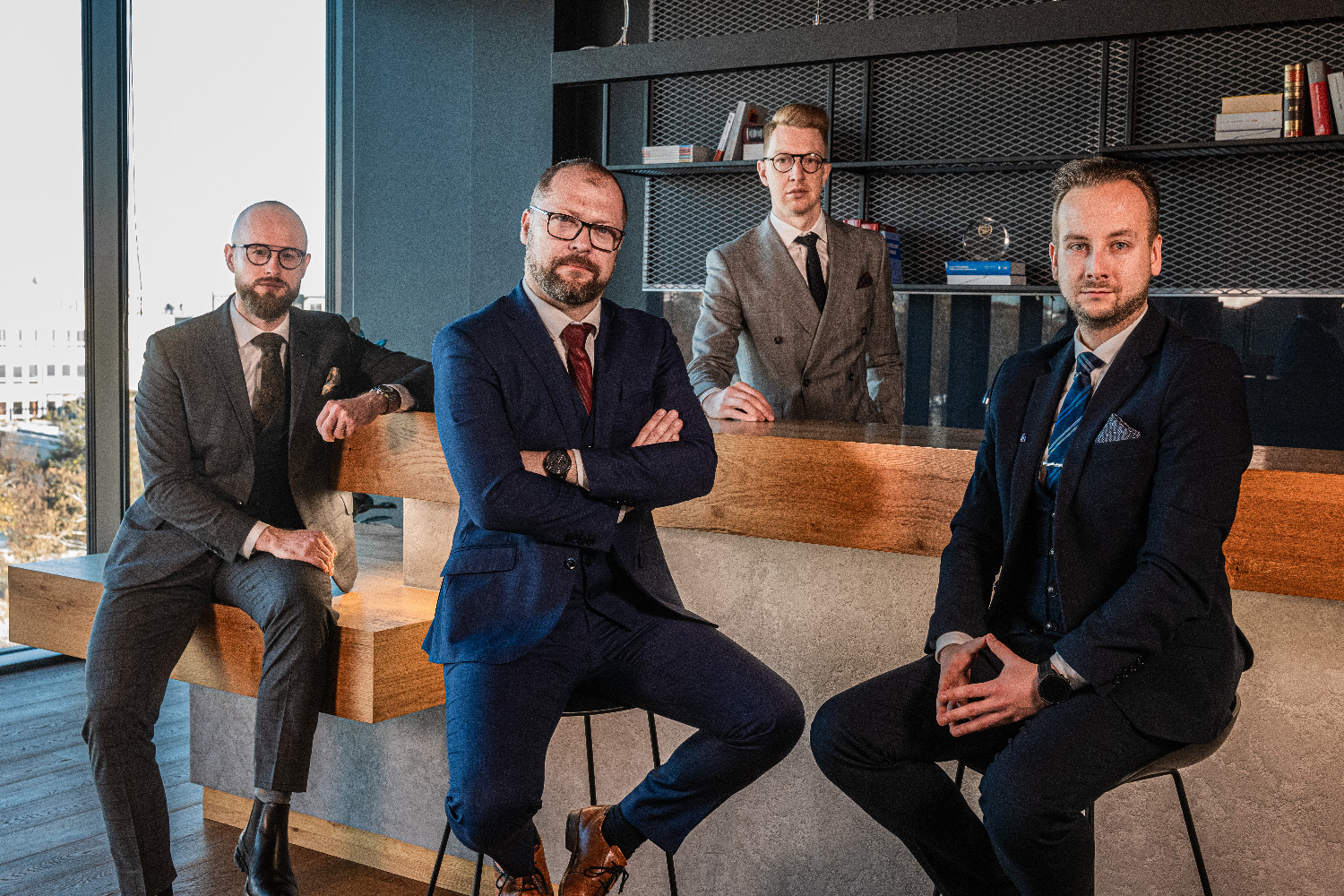.png)
Family businesses and succession: handing over the business without worries
Handing over a family business to the next generation is a major life and business decision that raises many questions. How can you ensure a smooth transition, protect your assets, and maintain family relationships? Here you will find specific answers to your questions and practical advice on how to prepare for succession so that your business will continue to thrive in the future and you can enjoy peace of mind.

(on the photo ARROWS team – pictured from left: Jakub Oliva, Antonín Hajdušek, Petr Hanzel and Oliver Uraz)
Why is succession in a family business more than just business?
Succession in family businesses is a process that affects not only economic aspects, but also deep personal and family ties. It is an emotionally charged process that affects not only the running of the business, but also family relationships, often leading to internal conflicts or a lack of strategic agreement.
Successful business succession therefore requires a sensitive approach and the ability to work with emotions and historical ties that are intertwined with business decisions in a family context.
The Czech Republic is currently facing a unique situation. Family businesses were disrupted by the communist regime, and most of the companies operating today were established after 1990. This means that the current wave of business transfers is the first experience with succession for many founders, who lack previous experience or established procedures.
Founders must therefore learn how to transfer their businesses, just as they once learned how to start and run them. This lack of "institutional memory" increases the need for external expert assistance that can provide structured guidance and best practices.
Are you unsure about this topic?
Succession in a family business is threefold: it involves handing over the management of the business, transferring ownership, and at the same time impacting family relationships. These three areas are inextricably linked, and a successful handover requires a comprehensive solution to all three pillars simultaneously. It is not possible to focus solely on the legal aspects of the transfer of assets and neglect the dynamics of family relationships or management continuity.
The transfer of a company is not a one-off event, but a long-term process that should ideally begin three years before the actual transfer. The average "lifespan" of a company founder is approximately 25 years, which provides sufficient time for careful preparation and gradual steps.
An incomplete transformation of the company structure or an inadequately resolved transfer of management to a successor are among the greatest risks that can threaten not only the operation of the company, but ultimately its very existence. Proactive and timely planning is therefore key to ensuring the stability and future of a family business. ARROWS lawyers have extensive experience in dealing with these complex situations and assist clients in preparing strategic succession plans.

(The premises of our law firm, where we provide legal services to our clients.)
Don't be caught off guard: Key risks and how ARROWS helps address them
Many family businesses are optimistic about growth, but in reality they are not sufficiently prepared for the crucial process of succession. This significant gap between ambition and actual preparedness creates vulnerability that can threaten the long-term stability and survival of the business. Focusing on short-term growth without ensuring long-term continuity is a significant risk.
Below is an overview of the most common risks associated with succession in family businesses and how ARROWS can help you effectively address them:
| Risk to Address | Potential Issues and Sanctions | How ARROWS Helps |
|---|---|---|
| Unplanned Business Succession | Sudden loss of the founder (due to illness or death) can lead to legal uncertainty, management chaos, and jeopardize business continuity. | Preparation of documentation to prevent penalties and sanctions, including wills and inheritance agreements; legal consultations to avoid fines and inspections. |
| Family Conflicts and Disagreements | Strong interpersonal conflicts among family members, lack of agreement on strategy, or inability to make decisions can paralyze the business and damage relationships. | Drafting internal policies and a family constitution to establish clear rules and conflict resolution mechanisms; mediation and legal opinions. |
| Unprepared Successor | Successors may lack the necessary skills, vision, or authority, leading to ineffective management and declining company performance. | Professional training for employees or management with certification; legal consultations to define managerial roles and responsibilities. |
| Unclear Property Settlement | Poor legal handling of share transfers can lead to high tax implications, disputes among heirs, or threaten company liquidity due to large payout obligations. | Preparation or review of share transfer agreements; legal opinions on tax consequences; establishment of trusts to protect assets. |
| Omission of Compulsory Heirs | An incomplete or incorrect will can result in lawsuits from children or other statutory heirs entitled to a mandatory share. | Legal consultations on inheritance law; preparation of wills and inheritance agreements in accordance with the law; court representation. |
| Non-compliance with Legal Formalities | Mistakes in documentation, missing signature verification, or failure to register changes in the commercial register can render transfers invalid or cause issues. | Preparation of legally required documentation; ensuring signature verification and registration of changes; legal consultations. |
| Loss of Founder’s Control | Fear of losing influence completely after succession can prevent founders from starting the transition process. | Creation of a family holding; setting up a trust with the possibility to control trustees; drafting agreements enabling gradual handover. |
ARROWS regularly deals with these issues and is ready to help you with these and other challenges.
Legal paths to a smooth transfer: How ARROWS secures your future
There are several proven legal tools for transferring a family business, each with its own specifics and tax implications. ARROWS lawyers will help you choose the most suitable path for your specific situation and ensure that the entire process runs smoothly and without worries.
Transfer of shares during lifetime: Gift or sale
One of the most common methods is to transfer business shares or stocks to descendants while the founder is still alive. This transfer can be either gratuitous (gift) or for consideration (sale), depending on family preferences and tax considerations.
(on the photo Ondřej Stehlík, specialist in family business law, ARROWS)
The advantage of a transfer during the lifetime of the founder is the possibility of a gradual generational change, whereby the founder can initially retain part of the share (e.g., a controlling stake) and transfer the rest to their children. This allows them to supervise the running of the company and gradually hand over responsibility.
When selling a share, taxable income must be taken into account for the seller, but there is a time test for tax exemption for individuals. Transfer within the family is relatively tax-friendly, especially in the form of a gift. It is also important to remember the legal formalities. The main document is the contract for the transfer of business shares or stocks, which must include the identification of the parties, a description of the subject matter, the purchase price, and the date of transfer.
For some legal forms, such as a limited liability company, signatures must be verified by a notary. Subsequently, the changes must be entered in the commercial register by filing a request for registration of the change with the registry court. ARROWS will prepare all the necessary documentation for you and ensure a smooth transfer.
Who can you turn to?
Inheritance: Will, inheritance contract, and legal succession
If the transfer of a company is not resolved during the lifetime of the owner, inheritance law comes into play. In the Czech legal system, there are three main types of inheritance with a clear hierarchy: inheritance contract, will, and inheritance by law.
An inheritance contract is the strongest title to inheritance and takes precedence over both a will and the law. It can only be concluded for three quarters of the estate, with the remaining quarter remaining free for the testator's separately expressed wishes, for example in the form of a will.
A will is a unilateral legal act by which the testator determines the heirs and their shares. It must be written by hand, in another written form in the presence of witnesses, or in the form of a notarial deed. When drawing up a will, it is essential to respect the rights of the so-called mandatory heirs – the testator's direct descendants.
Adult descendants are always entitled to a compulsory share amounting to one quarter of their legal inheritance share, even if they have been omitted from the will. A company cannot be completely denied to one of the children by a will without them receiving at least adequate financial compensation. ARROWS will help you prepare a will or inheritance contract so that it is valid, enforceable, and minimizes the risk of future disputes, including taking into account the rights of compulsory heirs.
Need help with this topic?
If the deceased does not leave a will or inheritance contract, inheritance is governed by law and divided into six inheritance classes. In the first class, children and spouses inherit equal shares. All assets are inherited, including debts, which are assumed by the heir.
This can be a significant risk for a company if the heirs are not interested in running it or if the payment of settlement shares would jeopardize the company's liquidity. ARROWS provides legal advice on inheritance law and represents clients in inheritance proceedings.
Trust fund: Asset protection and long-term management
A trust fund is an increasingly popular tool for the long-term protection of assets and ensuring the continuity of a family business. The fund is established by registration in the trust fund register and is governed by a statute, which is a document containing the rules for the management of the assets and the designation of the beneficiaries. Beneficiaries are typically family members who benefit from the fund's assets (e.g., company profits) without necessarily having a direct say in its management.
The original owner can retain some control over the company if they become one of the trustees (the fund must have at least two trustees) or reserve the right to appoint and dismiss trustees. In practice, it has proven useful to appoint several trustees, at least one of whom is an independent expert, such as a lawyer, to ensure mutual control and compliance with the statutes.
A trust fund is ideal for separating ownership from management, which can be crucial for maintaining the stability of a company if there is no suitable successor in the family to take over direct management. ARROWS has extensive experience in drafting internal guidelines and preparing comprehensive documentation for the establishment and management of trust funds.
Family holding and family constitution: Strategies for future generations
An alternative way to organize assets for future generations is to create a family holding and draw up a so-called family constitution.
A family holding means that family businesses are transferred to a single umbrella company in which family members hold shares. This structure can simplify management, optimize the tax burden, and facilitate future transfers.
Although not legally enforceable as a law, a family constitution acts as a strong agreement within the family. It can formulate principles for decision-making, profit distribution, dispute resolution, and mechanisms for sanctions for undesirable behavior.
The constitution ensures that all family members know where they stand and contributes to harmonious cooperation between generations. ARROWS provides comprehensive legal advice and assists with the preparation of family constitutions and the establishment of an appropriate legal structure for family businesses, including family holding companies.
Business Corporations Act: A key framework for transfers
The Business Corporations Act (Act No. 90/2012 Coll., hereinafter referred to as the "ZOK") provides the basic legal framework for the operation and transfer of commercial companies in the Czech Republic. It is key to understanding the conditions for the transfer of shares, especially in limited liability companies (s.r.o.).
The transfer of a share may be represented by a share certificate, which is a negotiable instrument, or it may not be represented. The transfer of a share certificate is simpler and faster, as it is effected by mere endorsement and transfer, often without the need to convene a general meeting.
Who can you turn to?
If the share is not represented by a share certificate, which is more common in practice, the conditions of transfer depend on the articles of association. The ZOK allows the transfer of a share to another shareholder without the consent of the company's bodies, unless the articles of association provide otherwise.
However, the transfer of a share to a third party usually requires the prior consent of the general meeting, unless the articles of association exclude this restriction. This gives other shareholders control over the entry of new persons into the company. ARROWS has in-depth knowledge of the ZOK and will help you prepare or revise contracts and documentation to ensure they comply with the law and the articles of association, and will represent you before administrative authorities.
Your family business deserves a secure future with ARROWS
Transferring a family business is one of the most demanding but also most important steps in the life of every entrepreneur. As we have shown, it is not just a legal transaction, but a complex process that touches on emotions, family relationships, and the long-term stability of the business. Insufficient preparation or omission of key legal aspects can have fatal consequences for your company and family ties.
ARROWS Law Firm understands the specifics of family business and has fifteen years of experience in dealing with these sensitive issues. Our lawyers deal with these issues on a daily basis and are ready to provide you with comprehensive legal services that will give you peace of mind and certainty. Whether you need to draft internal guidelines, prepare documentation to protect you from fines and penalties, or obtain a legal opinion, we are here for you.
We can help you prepare or review contracts, represent you in court and before administrative authorities, obtain the necessary licenses or permits, and even provide specialized training for your employees or management. Our goal is to ensure that your family business thrives for generations to come, so you can focus on what matters most to you.
Don't leave anything to chance and secure the future of your company in good time. Contact ARROWS Law Firm today and arrange an initial consultation. Together, we will find the best solution for your family business.
Read our articles:
- 7. 4. 2025 - Intergenerational handover of the family business:Legal options, risks and recommendations
- 14. 3. 2025 - Family businesses and succession: handing over the business without worries
- 14. 2. 2025 - The Family Constitution The key to preserving family property for future generations
Don't want to deal with this problem yourself? More than 2,000 clients trust us, and we have been named Law Firm of the Year 2024. Take a look HERE at our references.

.png)
.png)
.png)